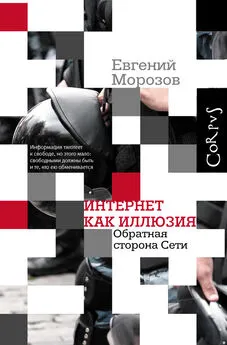Евгений Морозов - Интернет как иллюзия. Обратная сторона сети
- Название:Интернет как иллюзия. Обратная сторона сети
- Автор:
- Жанр:
- Издательство:Array Литагент «Corpus»
- Год:2014
- Город:Москва
- ISBN:978-5-17-084792-1
- Рейтинг:
- Избранное:Добавить в избранное
-
Отзывы:
-
Ваша оценка:
Евгений Морозов - Интернет как иллюзия. Обратная сторона сети краткое содержание
Интернет как иллюзия. Обратная сторона сети - читать онлайн бесплатно полную версию (весь текст целиком)
Интервал:
Закладка:
Junker, Detlef, and Philipp Gassert The United States and Germany in the Era of the Cold War, 1945–1990 : A Handbook . Vol. 1. New York: Cambridge University Press, 2004.
Kampfner, John Freedom for Sale: How We Made Money and Lost
Our Liberty . Kindle edition. New York: Simon & Schuster, 2009. Kellner, D. From 1984 to One-Dimensional Man: Critical Reflections on Orwell and Marcuse // Current Perspectives in Social Theory 10 (1990): 223–252.
Kern, H. L. Foreign Media and Protest Diffusion in Authoritarian Re-gimes: The Case of the 1989 East German Revolution // Compara-tive Political Studies, March 16, 2010.
Kern, H. L., and J. Hainmueller Opium for the Masses: How Foreign Media Can Stabilize Authoritarian Regimes // Political Analysis 17, no. 4 (2009): 377–399.
Khiabany, G. Iranian Media: The Paradox of Modernity // Social Semiotics 17, no. 4 (2007): 479–501.
Klein, Naomi China’s All-Seeing Eye // Rolling Stone, May 14, 2008. KohÁk, E. Ashes, Ashes… Central Europe After Forty Years //
Daedalus 121, no. 2 (1992): 197–215.
Korosteleva, Elena Was There a Quiet Revolution? Belarus After the 2006 Presidential Election // Journal of Communist Studies and Transition Politics 25, no. 2 (June 2009): 324–346.
Kraidy, M. M. Reality TV and Multiple Arab Modernities: A Theoreti-cal Exploration // Middle East Journal of Culture and Communi-cation 1, no. 1 (2008): 49–59.
Lagerkvist, J. Internet Ideotainment in the PRC: National Responses to Cultural Globalization // Journal of Contemporary China 17, no. 54 (2008): 121–140.
Manaev, Oleg The Influence of Western Radio on the Democra-tization of Soviet Youth // Journal of Communication 41, no. 2 (June 1991): 72–91.
Marcuse, Herbert One-Dimensional Man: Studies in the Ideology of Advanced Industrial Society . New York: Routledge, 2002.
Maza, Erik Cuban Commies Give Avatar the Thumbs-Down // Mi-ami New Times, February 18, 2010.
Meyen, M., and W. Hillman Communication Needs and Media Change: The Introduction of Television in East and West Germany // European Journal of Communication 18, no. 4 (2003): 455.
Meyen, M., and U. Nawratil The Viewers: Television and Every-day Life in East Germany // Historical Journal of Film, Radio and Television 24, no. 3 (2004): 355–364.
Meyen, M., and K. Schwer Credibility of Media Offerings in Cen-trally Controlled Media Systems: A Qualitative Study Based on the Example of East Germany // Media, Culture & Society 29, no. 2 (2007): 284.
Miller Llana, Sara Cuba’s Youth: Restless but Not Often Political // Christian Science Monitor, July 26, 2008.
Mirsky, Jonathan Vietnam Now // New York Review of Books, June 24, 2010.
Mobile Phones Change Dating Habits as Saudis Search for New Iden-tity // Irish Times, March 3, 2009.
Moore, Matthew China to Lead World Scientific Research by 2020 // Daily Telegraph, January 25, 2010.
Mostaghim, Ramin, and Borzou Daragahi Iran’s Other
Youth Movement // Los Angeles Times, June 10, 2007. Murphy, Caryle Saudi Women Revel in Online Lives // Global
Post, February 4, 2010. www.globalpost.com/dispatch/saudi-ara-bia/100203/internet-women.
Nelson, Michael War of the Black Heavens: The Battles of Western Broadcasting in the Cold War . Syracuse, NY: Syracuse University Press, 1997.
Orwell, George 1984. New York: Signet Classic, 1977.
Pfaff, S., and H. Kim Exit-Voice Dynamics in Collective Action: An Analysis of Emigration and Protest in the East German Revolution // American Journal of Sociology 109, no. 2 (2003): 401–444.
Porn Dominates Saudi Mobile Use // BBC News, April 25, 2007. Posner, R. A. Orwell Versus Huxley: Economics, Technology, Privacy, and Satire // Philosophy and Literature 24, no. 1 (2000): 1–33.
Postman, Neil Amusing Ourselves to Death: Public Discourse in the Age of Show Business . Twentieth anniversary edition. New York: Penguin Books, 2006.
Prior, Markus Post-Broadcast Democracy: How Media Choice In-creases Inequality in Political Involvement and Polarizes Elections . New York: Cambridge University Press, 2007.
Problems of Communism . Vol. 12. Washington, DC: Documentary Studies Section, International Information Administration, U. S. De-partment of State, 1963.
Quester, George H. Before and After the Cold War: Using Past
Forecasts to Predict the Future . Portland, OR: Frank Cass, 2002. Rantanen, T. The Old and the New: Communications Techno logy and
Globalization in Russia // New Media & Society 3, no. 1 (2001): 85. Rosen, S. The Victory of Materialism: Aspirations to Join China’s Ur-ban Moneyed Classes and the Commercialization of Education // China Journal (2004): 27–51.
Rosenstiel, Thomas B. TV, VCRs Fan Fire of Revolution // Los Angeles Times, January 18, 1990.
Roth, Philip A Conversation in Prague // New York Review of Books, April 12, 1990.
Rueschemeyer, Marilyn, and Christiane Lemke The Quality of Life in the German Democratic Republic: Changes and Developments in a State Socialist Society . Armonk, NY:
M. E. Sharpe, 1989.
Russian Internet Users Care Most About Love, Weight Losing // Associ-ated Press, March 22, 2010.
Schielke, S. Boredom and Despair in Rural Egypt // Contemporary Islam 2, no. 3 (2008): 251–270.
Schwoch, J. Cold War Telecommunications Strategy and the Question of German Television // Historical Journal of Film, Radio and Television 21, no. 2 (2001): 109–121.
Semuels, Alana Unlikely Forum for Iran’s Youth // Los Angeles Times, January 2, 2008.
Sex, Social Mores, and Keyword Filtering: Microsoft Bing in the “Arabian Countries” // OpenNet Initiative, March 4, 2010. opennet.net/ sex-social-mores-and-keyword-filtering-microsoft-bing-arabian-countries.
Snyder, Alvin A. Warriors of Disinformation: American Propaganda,
Soviet Lies, and the Winning of the Cold War . New York: Arcade, 1997. Sola Pool, Ithiel de Communication in Totalitarian Societies /
In: Handbook of Communication , ed. by Sola Pool, Ithiel de, Schramm, W., Maccoby, N., and E. Parker, 463–474. Chicago: Rand McNally, 1973.
Sreberny, A. The Analytic Challenges of Studying the Middle East and its Evolving Media Environment // Middle East Journal of Culture and Communication 1, no. 1 (2008): 8–23.
Sreberny-Mohammadi, A. Small Media for a Big Revolution: Iran // International Journal of Politics, Culture, and Society 3, no. 3 (1990): 341–371.
Sullivan, Kevin Saudi Youth Use Cellphone Savvy to Outwit the
Sentries of Romance // Washington Post, August 6, 2006. Sydell, Laura Chinese Fans Follow American TV Online – for Free //
National Public Radio, June 24, 2008.
Tait, Robert Iran Launches First Online Supermarket // Guardian, February 4, 2010.
Talbot, David Bing Dinged on Arab Sex Censorship // Technology Review Editors’ Blog, March 4, 2010. www.technologyreview.com/ blog/editors/24891/?utm_source=twitterfeed&utm_medium =twitter.
Thussu, Daya Kishan News as Entertainment: The Rise of Global Infotainment . Thousand Oaks, CA: Sage, 2007.
Trachtenberg, Jeffrey A. Philip Roth on “The Humbling” // Wall Street Journal, October 30, 2009.
Vietnam to Offer Movies about Sex on Internet // Reuters, July 20, 2006.
Wang, X. The Post-Communist Personality: The Spectre of China’s Capitalist Market Reforms // China Journal (2002): 1–17.
Web Link to China Teen Pregnancy // BBC News, July 10, 2007. Weitz, Eric D. Creating German Communism, 1890–1990 : From
Popular Protests to Socialist State . Princeton, NJ: Princeton Uni-versity Press, 1997.
Wheary, Jennifer The Global Middle Class Is Here: Now What? // World Policy Journal 26, no. 4 (January 2010): 75–83.
Wilson, Ben What Price Liberty? London: Faber & Faber, 2009. Zhang, L. L. Are They Still Listening? Reconceptualizing the Chinese
Audience of the Voice of America in the Cyber Era // Journal of Ra-dio Studies 9 (2002): 317.
Глава 4. Чего хотят цензорыГликин, М., Костенко Н. Чудо возможно // Ведомости,
15 февраля 2010 года. Легезо, Д. Медведев читает свой ЖЖ и решает проблемы //
CNews, 8 октября 2009 года. www.cnews.ru/news/top/index. shtml?2009/10/08/364944.
Сергей Миронов предлагает ведущим пользователям Рунета и блогерам выработать правила сетевой цензуры // ИА Прайм-ТАСС, 30 сентября 2009 года. en.rian.ru/russia/20100126/157686584.html.
У Дмитрия Медведева появился iPad // Lenta.ru, 18 мая 2010 года. www.lenta.ru/news/2010/05/18/ipad/.
Adams, P. C. Protest and the Scale Politics of Telecommunications //
Political Geography 15, no. 5 (1996): 419–441.
Agre, P. E. Real-Time Politics: The Internet and the Political Process //
Information Society 18, no. 5 (2002): 311–331.
Al Hussaini, Amira Arabeyes: No to “Offensive’ Blogs” // Global
Voices, February 14, 2008.
Albrecht, H. How Can Opposition Support Authoritarianism? Les-sons From Egypt // Democratization 12, no. 3 (2005): 378–397. Ameripour, Aghil, Nicholson, Brian, and Michael
Newman Internet Usage Under Authoritarian Regimes: Convivi-ality, Community, Blogging and Online Campaigning in Iran //
IDPM Working Paper 43 (2009). www.sed.manchester.ac.uk/ idpm/research/publications/wp/di/di_Wp43.htm.
Anger in China over Web Censorship // BBC News, June 30, 2009. Arkhipov, Ilya, and Lyubov Pronina Putin Fire Webcams
Show Power Pyramid Makes Local Leaders Reluctant to Act // Bloomberg News, August 25, 2010.
Baber, Z. Engendering or Endangering Democracy? The Internet, Civil Society and the Public Sphere // Asian Journal of Social Science 30, no. 2 (2002): 287–303.
Bambauer, Derek E. Cybersieves // Duke Law Journal 59 (2009). Becker, J. Lessons From Russia: A Neo-Authoritarian Media System //
European Journal of Communication 19, no. 2 (2004): 139. Bhagwati, Jagdish Made in China // New York Times Book Re-view, February 18, 2007.
Blaydes, Lisa Authoritarian Elections and Elite Management: Theory and Evidence from Egypt . Presented at the Conference on Dictator-ships: Their Governance and Social Consequences , Princeton Univer-sity, April 2008. www.princeton.edu/~piirs/Dictatorships042508/ Blaydes.pdf.
Boix, Carles, and Milan Svolik The Foundations of Limited Authoritarian Government: Institutions and Power-Sharing in Dic-tatorships // Social Science Research Network Working Paper Se-ries, June 1, 2010.
Bueno De Mesquita, Ethan Regime Change and Revolutio-nary Entrepreneurs // American Political Science Review 104 (3): 446–466.
Builder, Carl H., and Steven C. Bankes The Etiology of European Change . Santa Monica, CA: RAND, 1990.
Burrows, Peter Internet Censorship, Saudi Style // Business Week, November 13, 2008.
Читать дальшеИнтервал:
Закладка:










